Letters from Lodi
An insightful and objective look at viticulture and winemaking from the Lodi
Appellation and the growers and vintners behind these crafts. Told from the
perspective of multi-award winning wine journalist, Randy Caparoso.
Stonum Vineyards is a little Lodi handcraft winery that could
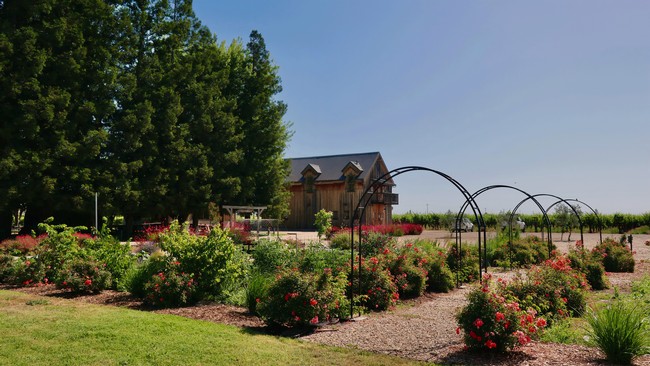
Stonum Vineyards' tasting room and trellised Zinfandel fronted by an organic vegetable and flower garden (the latter, also cultivated as a beneficial insectary).
Teeny-tiny Stonum Vineyards, located on Alpine Rd. on what locals call the "east side" of Lodi, is growing up.
But lest you think this means they've joined the ranks of big or even medium-sized producers, think again. The winery's production has recently topped off at about 1,000 cases a year⏤minuscule even by the standards of other small Lodi wineries. According to owner/grower/winemaker Kathy Stonum, that's as far as they go.
"We want to remain hands-on," says Ms. Stonum. "We'd like to keep all the work in the family, not have to hire people from outside."
The 1,000-case level, however, is a significant increase from just five years ago, when production was barely 200 cases. The estate vineyard⏤15 acres planted entirely to open-canopy trellised Zinfandel⏤can produce much more, but most of the grapes are sold to other wineries.
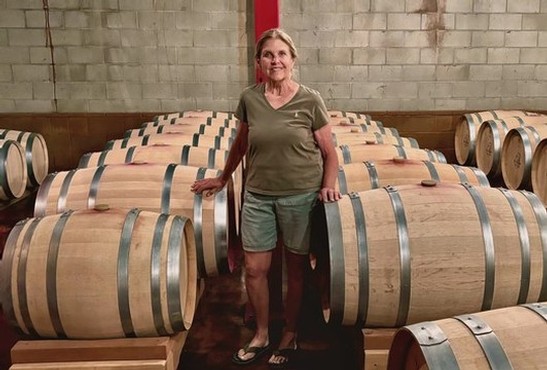
Stonum Vineyards owner/grower/winemaker Kathy Stonum in her estate winery barrel cellar.
The grapevines first went into the ground in 1989, but the first bottling of an actual Stonum Vineyards brand Zinfandel wasn't produced until 2009. The winery's tasting room⏤an unusual (for the appellation), stained natural timber framed, American Gothic-like barn⏤was completed barely five years ago. This is not a family in a great deal of hurry to get things done.
Stonum, however, is far from short on creative juices. Although they've been producing both reds and dry rosés from their estate-grown Zinfandel, they've also been playing with other varietals not grown by them.
According to Ms. Stonum, "The red Zinfandel is bottled under the Stonum label, as is our Chardonnay and Cabernet Sauvignon. In 2020 we started a KMS Collection brand consisting of wines produced from purchased fruit. In the past, the KMS labels have included Petite Sirah, Malbec, and Carignan. We've also been putting our Zinfandel rosés under the second label."
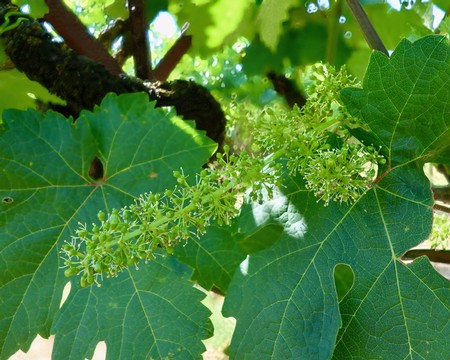
Zinfandel fruit set earlier this week in Stonum Vineyards.
When asked why, Stonum said, "Oh, we just like to experiment"⏤the "we," referring primarily to her niece Francesca Stonum-Kerney, who assists with the winemaking and vineyard management.
"Tastes are constantly changing. A few years ago people still liked oaky styles of Chardonnay, but now the pendulum has swung towards bright, crisp, refreshing styles of white wines fermented in stainless steel and aged, at the most, in barrels that don't impart oak flavors. That's the reason this year [2024] we hope to add an Albariño. I think the key is listening to customers to see what they're looking for."
The flagship remains the estate's sustainably farmed (certified by LODI RULES for Sustainable Winegrowing) Zinfandel, which Stonum culls from their oldest rows, which started off as head-trained vines but were later retro-fitted onto trellises that still replicate a canopy of leaves allowing dappled sunlight and air movement to maximize fruit quality.
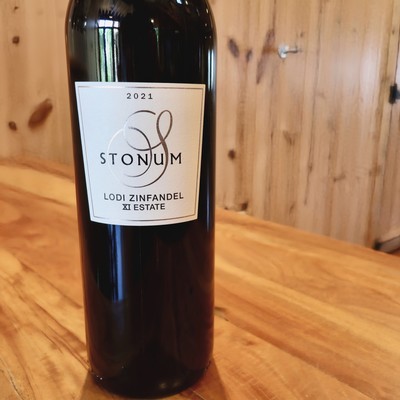
Only 209 cases of the 2021 Stonum Vineyards XI Mokelumne River-Lodi Zinfandel ($38) were produced, and it is a model of restraint, purely floral red berry perfume, zesty natural acidity and moderate tannin accentuating a silky texture. In other words, a classic "east side" Lodi Zinfandel (west side Lodi Zinfandels tend to be earthier, slightly fatter, and have darker berryish fruit). A touch of French oak adds a transparent vanillin veneer, while also playing up some Asian tea-like nuances and just a touch of sweet black pepper spice.
Explains Stonum, "All our Zinfandels are native yeast fermented because we think that's the best way to capture the terroir of the Stonum vineyard, which is what we're all about. We do the same with all our other wines to capture a sense of place. We give our growers full credit by putting the name of their vineyards on our labels."
At 14.0% ABV, the 2021 Stonum Zinfandel is neither light nor heavy. Says Stonum, "The Zinfandel sees 100% French oak, which adds structure, but not so much that it takes away from the natural profile of the wine.
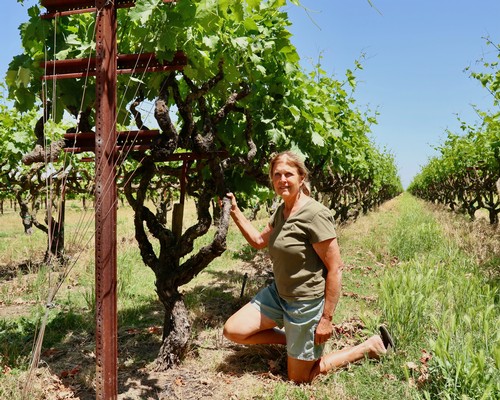
Kathy Stonum with row of of the estate's oldest Zinfandel vines (planted in 1989), originally planted as head trained plants and later fitted onto open-canopy trellis wires to preserve the dappled sunlight and airflow optimal for fruit quality.
"We haven't been able to get it exactly the way we want every year," she adds "but I like to pick our Zinfandel at 24.0°, 24.5° Brix (i.e., sugar reading). I think that's our sweet spot when you can feel, smell and taste the pure taste of our wine, specific to our vineyard. That's something I think you learn as you go, in every vintage."
The next most interesting wines in the current Stonum portfolio are, believe it or not, a set of two dry rosés produced from the estate-grown Zinfandel. Right now there are two vintages available, and they are two different wines because of the way they were vinified.
The first, the 2022 KMS Collection Rendezvous Estate Rosé of Zinfandel ($26) is a coral pink-tinted wine with pure, red berry/cherry fragrances; crisp, lightly tart, medium-full bodied on the palate. The effusive qualities remind you of why, for a good 25 or so years, pink wines made from Zinfandel (albeit, fruity "White Zinfandel," not dry like the Stonum rosés) was one of the country's most popular wines.
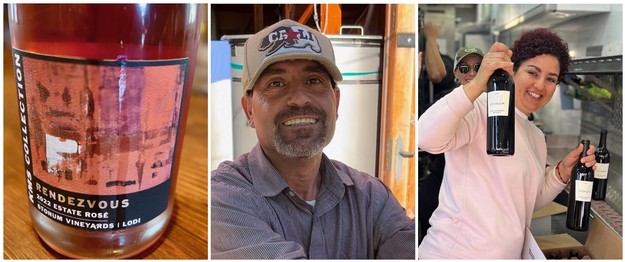
Stonum estate vineyard manager Sergio Barriga (middle) and tasting room mainstay Ana Calderon (right), for whom the 2021 KMS Collection Barriga Calderon Saignée Rosé was named. Stonum Vineyards.
Even more compelling, though, might be the 2021 KMS Collection Barriga Calderon Saignée Rosé ($21) which is just as dry but slightly lighter in weight than the 2022 Rendezvous. Whereas the Rendezvous was fermented in stainless steel, the 2021 Barriga Calderon (named after Stonum vineyard manager Sergio Barriga and tasting room mainstay Ana Calderon) was fermented and finished entirely in neutral oak barrels.
On a sensory level, though, the biggest difference between the two rosé bottlings is the fact that all the grapes going into the Rendezvous were pressed and fermented to produce a rosé, whereas the Barriga Calderon was made from Zinfandel juice bled off a vat of fermenting red Zinfandel⏤a winemaking practice called saignée⏤before (like all the Stonum wines) being fermented to dryness with native yeast.
The result, in the Barriga Calderon, is a deeper flavored rosé with notably more varietal spice and tea-like complexities, and also creamier, silkier textures on the palate⏤a great example of how saignée style rosés can benefit from more contact with grape skins than rosés made from grapes vinified entirely from grapes dedicated to rosé.

Kathy Stonum and Francesca Stonum-Kerney, in 1994 and 2023. Stonum Vineyards.
Three other current releases, well worth the attention of any follower of handcraft style Lodi wines:
2020 KMS Collection Unbroken Mokelumne River-Lodi Carignan ($35)⏤Buoyantly bright, zesty, pure varietal sourced from +90-year-old own-rooted vines on the west side of Lodi. Ringing cherry-like and kitchen spice perfumes; vinified with restraint (native yeast, 5 months neutral French oak, picked below 22.0° Brix) to achieve maximum food-versatility (screams for grilled salmon or blackened tuna!).
2020 Stonum Vineyards Alta Mesa-Lodi Cabernet Sauvignon ($45)⏤Sourced from Silvaspoons Vineyards, consisting of 85% of the varietal, blended with Malbec and Petit Verdot. Moderate yet sturdy tannin and slightly caramelized oak (American and French barrels) qualities add to a medium-full yet rounded, sumptuous feel, with the fruit-forward (as opposed to herbaceous) qualities associated with Lodi style Cabernet.
2022 Stonum Vineyards Mokelumne River-Lodi Chardonnay ($30)⏤From DeCosta Vineyard, sustainably farmed by the Kolber family, a Chardonnay crafted for those who say "I hate Chardonnay": Super-bright, fresh, pure, crisp, crunchy apple/pear qualities obtained by fermenting in stainless steel and spending the briefest amount of time in neutral French oak, just enough capture a sleek, creamy texture while completely avoiding the fat "butteriness" associated with most California Chardonnays.
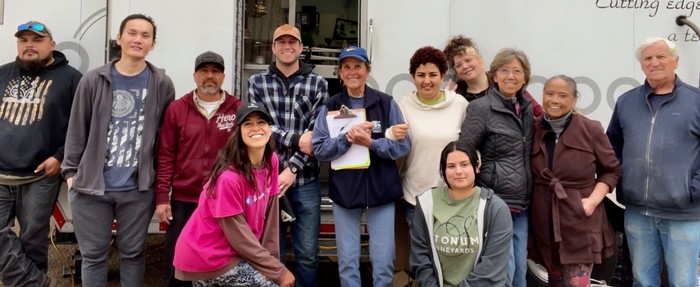
The Stonum family "team." Stonum Viineyards.